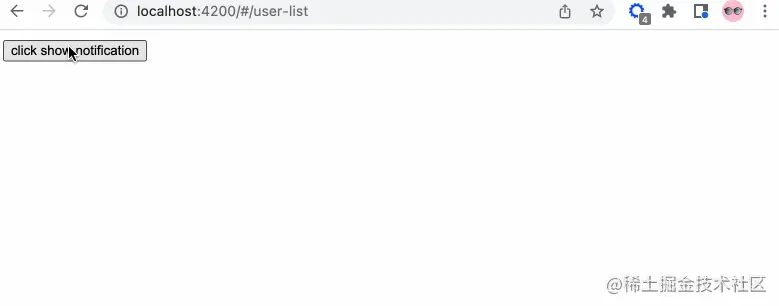Angular利用service实现自定义服务(notification)
本篇文章带大家继续angular的学习,了解一下Angular怎么利用service实现自定义服务(notification),希望对大家有所帮助!

在之前的文章中,我们有提到:
service 不仅可以用来处理 API 请求,还有其他的用处
比如,我们这篇文章要讲到的 notification 的实现。【相关教程推荐:《angular教程》】
效果图如下:

UI 这个可以后期调整
So,我们一步步来分解。
添加服务
我们在 app/services 中添加 notification.service.ts 服务文件(请使用命令行生成),添加相关的内容:
// notification.service.ts import { Injectable } from '@angular/core'; import { Observable, Subject } from 'rxjs'; // 通知状态的枚举 export enum NotificationStatus { Process = "progress", Success = "success", Failure = "failure", Ended = "ended" } @Injectable({ providedIn: 'root' }) export class NotificationService { private notify: Subject<NotificationStatus> = new Subject(); public messageObj: any = { primary: '', secondary: '' } // 转换成可观察体 public getNotification(): Observable<NotificationStatus> { return this.notify.asObservable(); } // 进行中通知 public showProcessNotification() { this.notify.next(NotificationStatus.Process) } // 成功通知 public showSuccessNotification() { this.notify.next(NotificationStatus.Success) } // 结束通知 public showEndedNotification() { this.notify.next(NotificationStatus.Ended) } // 更改信息 public changePrimarySecondary(primary?: string, secondary?: string) { this.messageObj.primary = primary; this.messageObj.secondary = secondary } constructor() { } }
是不是很容易理解...
我们将 notify 变成可观察物体,之后发布各种状态的信息。
创建组件
我们在 app/components 这个存放公共组件的地方新建 notification 组件。所以你会得到下面的结构:
notification ├── notification.component.html // 页面骨架 ├── notification.component.scss // 页面独有样式 ├── notification.component.spec.ts // 测试文件 └── notification.component.ts // javascript 文件
我们定义 notification 的骨架:
<!-- notification.component.html --> <!-- 支持手动关闭通知 --> <button (click)="closeNotification()">关闭</button> <h1>提醒的内容: {{ message }}</h1> <!-- 自定义重点通知信息 --> <p>{{ primaryMessage }}</p> <!-- 自定义次要通知信息 --> <p>{{ secondaryMessage }}</p>
接着,我们简单修饰下骨架,添加下面的样式:
// notification.component.scss :host { position: fixed; top: -100%; right: 20px; background-color: #999; border: 1px solid #333; border-radius: 10px; width: 400px; height: 180px; padding: 10px; // 注意这里的 active 的内容,在出现通知的时候才有 &.active { top: 10px; } &.success {} &.progress {} &.failure {} &.ended {} }
success, progress, failure, ended 这四个类名对应 notification service 定义的枚举,可以按照自己的喜好添加相关的样式。
最后,我们添加行为 javascript 代码。
// notification.component.ts import { Component, OnInit, HostBinding, OnDestroy } from '@angular/core'; // 新的知识点 rxjs import { Subscription } from 'rxjs'; import {debounceTime} from 'rxjs/operators'; // 引入相关的服务 import { NotificationStatus, NotificationService } from 'src/app/services/notification.service'; @Component({ selector: 'app-notification', templateUrl: './notification.component.html', styleUrls: ['./notification.component.scss'] }) export class NotificationComponent implements OnInit, OnDestroy { // 防抖时间,只读 private readonly NOTIFICATION_DEBOUNCE_TIME_MS = 200; protected notificationSubscription!: Subscription; private timer: any = null; public message: string = '' // notification service 枚举信息的映射 private reflectObj: any = { progress: "进行中", success: "成功", failure: "失败", ended: "结束" } @HostBinding('class') notificationCssClass = ''; public primaryMessage!: string; public secondaryMessage!: string; constructor( private notificationService: NotificationService ) { } ngOnInit(): void { this.init() } public init() { // 添加相关的订阅信息 this.notificationSubscription = this.notificationService.getNotification() .pipe( debounceTime(this.NOTIFICATION_DEBOUNCE_TIME_MS) ) .subscribe((notificationStatus: NotificationStatus) => { if(notificationStatus) { this.resetTimeout(); // 添加相关的样式 this.notificationCssClass = `active ${ notificationStatus }` this.message = this.reflectObj[notificationStatus] // 获取自定义首要信息 this.primaryMessage = this.notificationService.messageObj.primary; // 获取自定义次要信息 this.secondaryMessage = this.notificationService.messageObj.secondary; if(notificationStatus === NotificationStatus.Process) { this.resetTimeout() this.timer = setTimeout(() => { this.resetView() }, 1000) } else { this.resetTimeout(); this.timer = setTimeout(() => { this.notificationCssClass = '' this.resetView() }, 2000) } } }) } private resetView(): void { this.message = '' } // 关闭定时器 private resetTimeout(): void { if(this.timer) { clearTimeout(this.timer) } } // 关闭通知 public closeNotification() { this.notificationCssClass = '' this.resetTimeout() } // 组件销毁 ngOnDestroy(): void { this.resetTimeout(); // 取消所有的订阅消息 this.notificationSubscription.unsubscribe() } }
在这里,我们引入了 rxjs 这个知识点,RxJS 是使用 Observables 的响应式编程的库,它使编写异步或基于回调的代码更容易。这是一个很棒的库,接下来的很多文章你会接触到它更多的内容。
这里我们使用了 debounce 防抖函数,函数防抖,就是指触发事件后,在 n 秒后只能执行一次,如果在 n 秒内又触发了事件,则会重新计算函数的执行时间。简单来说:当一个动作连续触发,只执行最后一次。
ps:
throttle节流函数:限制一个函数在一定时间内只能执行一次。
在面试的时候,面试官很喜欢问...
调用
因为这个一个全局的服务,我们在 app.component.html 中调用此组件:
// app.component.html <router-outlet></router-outlet> <app-notification></app-notification>
为了方便演示,我们在 user-list.component.html 中添加按钮,方便触发演示:
// user-list.component.html <button (click)="showNotification()">click show notification</button>
触发相关的代码:
// user-list.component.ts
import { NotificationService } from 'src/app/services/notification.service';
// ...
constructor(
private notificationService: NotificationService
) { }
// 展示通知
showNotification(): void {
this.notificationService.changePrimarySecondary('主要信息 1');
this.notificationService.showProcessNotification();
setTimeout(() => {
this.notificationService.changePrimarySecondary('主要信息 2', '次要信息 2');
this.notificationService.showSuccessNotification();
}, 1000)
}至此,大功告成,我们成功模拟了 notification 的功能。相关的服务组件我们可以按照实际的需求进行修改,满足业务需求自定义。如果我们是开发内部使用的系统的话,建议使用成熟的 UI 库,它们已经帮我们封装好各种组件和服务,大量节省我们的开发时间。
更多编程相关知识,请访问:编程入门!!
以上就是Angular利用service实现自定义服务(notification)的详细内容,更多请关注其它相关文章!
